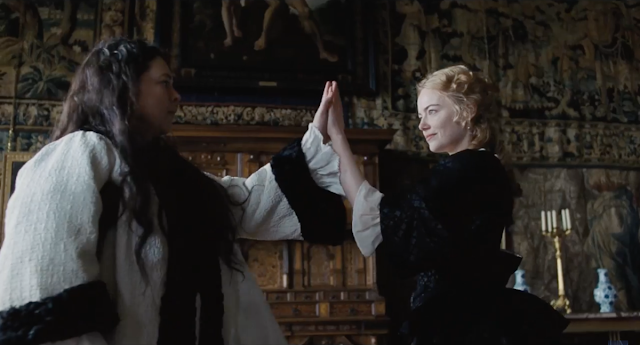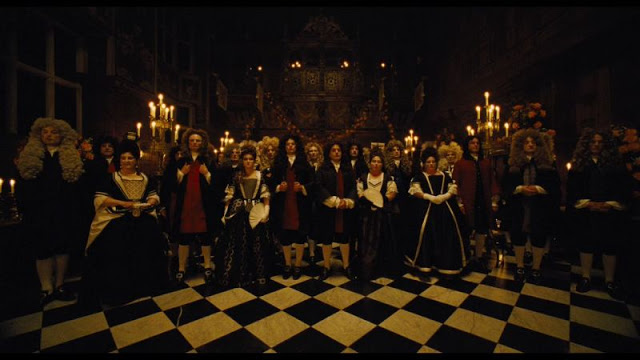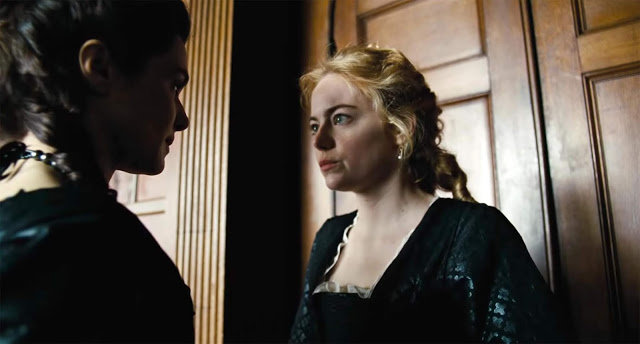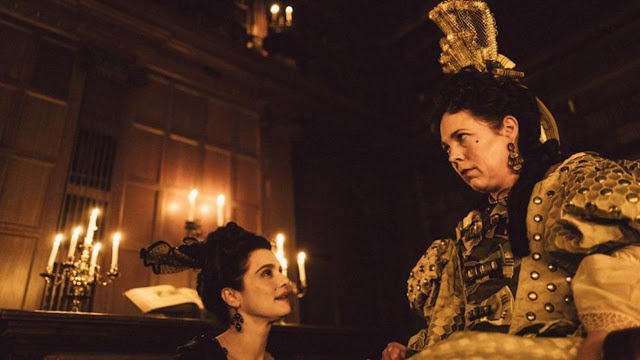Done to death, the British costume drama is given new life in The Favourite, a wickedly funny, deceptively sad movie about the ruling and the ruled. Its period trappings—the hushed candlelight, the sprawling castles, the finery and regalia—may seem unusual for a film by Yorgos Lanthimos, but then, no Yorgos Lanthimos film is usual. Having previously turned his lacerating eye on a number of twisted scenarios in the present—perversely homeschooled children, oppressively romantic dystopias, magically vengeful teenagers—the Greek director now looks backward, bringing his inimitable brand of irreverent humor and piercing technique to bear on the stuffy, pompous palaces of Stuart England. The Favourite may carry the sheen of a proper prestige production, but nobody here is behaving themselves.
Except maybe for Lanthimos. Of course, bad behavior is relative; it takes until The Favourite’s final scenes before a cuddly animal is abused, which for this occasionally sadistic filmmaker qualifies as a form of restraint. But even as he continues shoving his characters into confounding, humiliating situations—here, a genteel carriage ride through the countryside can quickly morph into the involuntary witnessing of a crude sex act—Lanthimos remains cool and crisp with the camera. Working with cinematographer Robbie Ryan (American Honey), he creates a gorgeous atmosphere that luxuriates in the period’s obscene extravagances, even as he methodically subverts them. (Ryan shoots a number of scenes with fisheye lenses, an approach that subtly warps the corners of the frame yet somehow enhances its beauty in the process.) The production design is impeccable, while the costumes and wigs—designed by the great Sandy Powell, who won Oscars dressing other English monarchs in The Young Victoria and Shakespeare in Love—are marvelously ornate. Visually, The Favourite is supple and elegant, which makes it the perfect vehicle to tell a story of backbiting and debauchery.
There are no true heroes in this movie, but there’s plenty of competition for chief villain. The most obvious candidate is Sarah (Rachel Weisz), the Duchess of Marlborough, who opens the film as the primary advisor to Queen Anne (Olivia Colman), an aging sovereign waylaid by gout and prone to bouts of rage and irritation. Sarah, whose husband (Mark Gatiss) commands the nation’s military, has systematically wormed her way into Anne’s confidence as well as her bed; she now plays puppet master, controlling the country’s purse strings and advancing her imperialistic agenda through well-timed flattery and the occasional sexual favor.
Sarah’s dominion is absolute, so she hardly perceives any threat from the arrival of Abigail (Emma Stone), her penniless cousin who stumbles into the castle smeared in mud and desperate for work. (The brief flashback illustrating how Abigail soiled herself is a casually brilliant piece of editing.) With icy regality, Sarah consents to let Abigail work as a scullery maid, but while Lanthimos briefly depicts her squalor, this is not a film about the indignities of menial service. Abigail may initially present as a harmless, helpless creature, but she quickly reveals an aptitude for political cunning and social climbing, and she wields her wits—as well as some therapeutic herbs, an act of recklessness, and a particularly well-timed sneeze—to catch Anne’s roving eye. Soon, when the Queen seeks companionship—someone to play with her rabbits, or her body—she is requesting the presence not of Sarah, but of Abigail.
What follows is a somewhat predictable, spectacularly wily cycle of scheming and one-upmanship. As Sarah and Abigail become rivals for the queen’s favor, they fling themselves into a passive-aggressive friendship of their own, one marked by feigned politeness and feverish manipulation. It’s a war of feminine wills that seems petty—multiple scenes of bird-shooting end with veiled threats, not to mention sprays of blood—until it grows increasingly severe; one minute, an offhand insult is uttered, and the next, someone’s tea is being poisoned.
As a tale of palace intrigue, Deborah Davis and Tony McNamara’s script has a Shakespearean bent; it’s easy to envision Sarah and Abigail as dueling Iagos, constantly using whispers and deceit to achieve their own nefarious ends. But Lanthimos structures most of The Favourite as an offbeat comedy, capturing the absurdity of the Stuart reign and heightening the contrast between his characters’ putative refinement and their vulgar desires. A sequence at a ball unfolds like Jane Austen by way of Zoolander, as a crowd of decked-out onlookers watch Sarah and a partner improvise a ludicrous dance. And when Anne holds court, she makes weighty pronouncements on important matters like tax policy (double it! wait, never mind!) without the foggiest understanding of what she’s saying. (Though the film isn’t heavily allegorical, it takes little imagination to perceive its striving characters as power-grubbing opportunists vying for the job of chief of staff at a more domestic house of government.)
Sex is especially funny in The Favourite; as much as the characters plot about marriage or pine for carnal knowledge, they tend to treat doing the actual deed like a transaction or a chore. A scene of foreplay in the woods between Abigail and a lusty suitor turns wonderfully violent, while a wedding night’s consummation is performed with hilarious efficiency. Indeed, the men in this movie—including a sniveling politician (Nicholas Hoult) who spars with Sarah and a horny young noble (Joe Alwyn ) who covets Abigail—behave like utter children, whether they’re pelting naked jesters with fruit or wagering on competitive duck-races. They may claim a small measure of status in the Queen’s court, but this is a woman’s world.
And what women they are. Conceptually and aesthetically, The Favourite is an impressive movie, but it’s elevated considerably by its three central performances, which complement each other perfectly, and in a way that renders the inevitable Oscarfying—who’s a lead? who’s supporting? which one do I pick??—diminishing and pointless. Each actor brings a duality to her performance, broadly announcing her character’s outward demeanor while gradually revealing the true emotions lurking underneath. (This is amplified by Lanthimos’ bold use of dissolves; he often stitches close-ups together so that faces seem to bleed into one another, evoking the idea of ever-shifting loyalties.) Colman portrays Queen Anne as addled and capricious, but she also hints at a perpetual longing that no amount of sex or wealth can truly satisfy. Weisz is so supremely chilly and self-assured as Sarah, you barely notice the way she silently brings forth a flicker of genuine decency. And in the trickiest part, Stone plays Abigail with a kind of fake guilelessness, a masked intelligence that camouflages her conniving nature. She’s a wolf in maid’s clothing.
And so, in its own sly and potent way, is this movie. Watching these three women try to outfox one another is generally delightful, especially when accompanied by Lanthimos’ sublime craft and the screenplay’s acrid dialogue. Yet while the majority of The Favourite is funny and entertaining, it eventually shifts gears into something more subtle and slippery. Having placed a smile on your face and extracted numerous laughs from your belly, it turns to darker matters of loss and pain. What was once a charming, whimsical farce becomes a veritable tragedy, a moving character study that proves to be deeply sad.
Queen Anne, you see, is more than just a dithering tyrant (though she is very much that); she is also a lost soul, desperate for real human connection. And Sarah and Abigail, in their frenzied attempts to bend her to their respective wills, treat her less as a person than a goal, a prize to be claimed by the winner of their secret battle. As The Favourite ratchets up the melodrama in its final act, its characters bare their true selves, and the result is both exciting and upsetting. As a certain TV series has taught us, when you play the game of thrones, you win or you die. The game played in this movie is no less consequential—the stakes are indeed life and death—but as The Favourite reaches its haunting, spellbinding conclusion, it’s fair to wonder if there was any winner at all.
That The Favourite’s poignancy surprised me is perhaps my own fault, given that Lanthimos pulled a similar trick with the romantic lunacy of The Lobster. But the degree of difficulty here was always extraordinarily high. How could Lanthimos, a ruthlessly capable craftsman and a gifted black comedian, turn a stuffy Anglophilic costume drama into a wrenching study of human greed and loneliness? Well, I’ve learned my lesson: When it comes to Lanthimos, never underestimate an underdog.
Jeremy Beck is the editor-in-chief of MovieManifesto. He watches more movies and television than he probably should.




